women to women
The Challenges: the mother of a gender-diverse tattoo artist
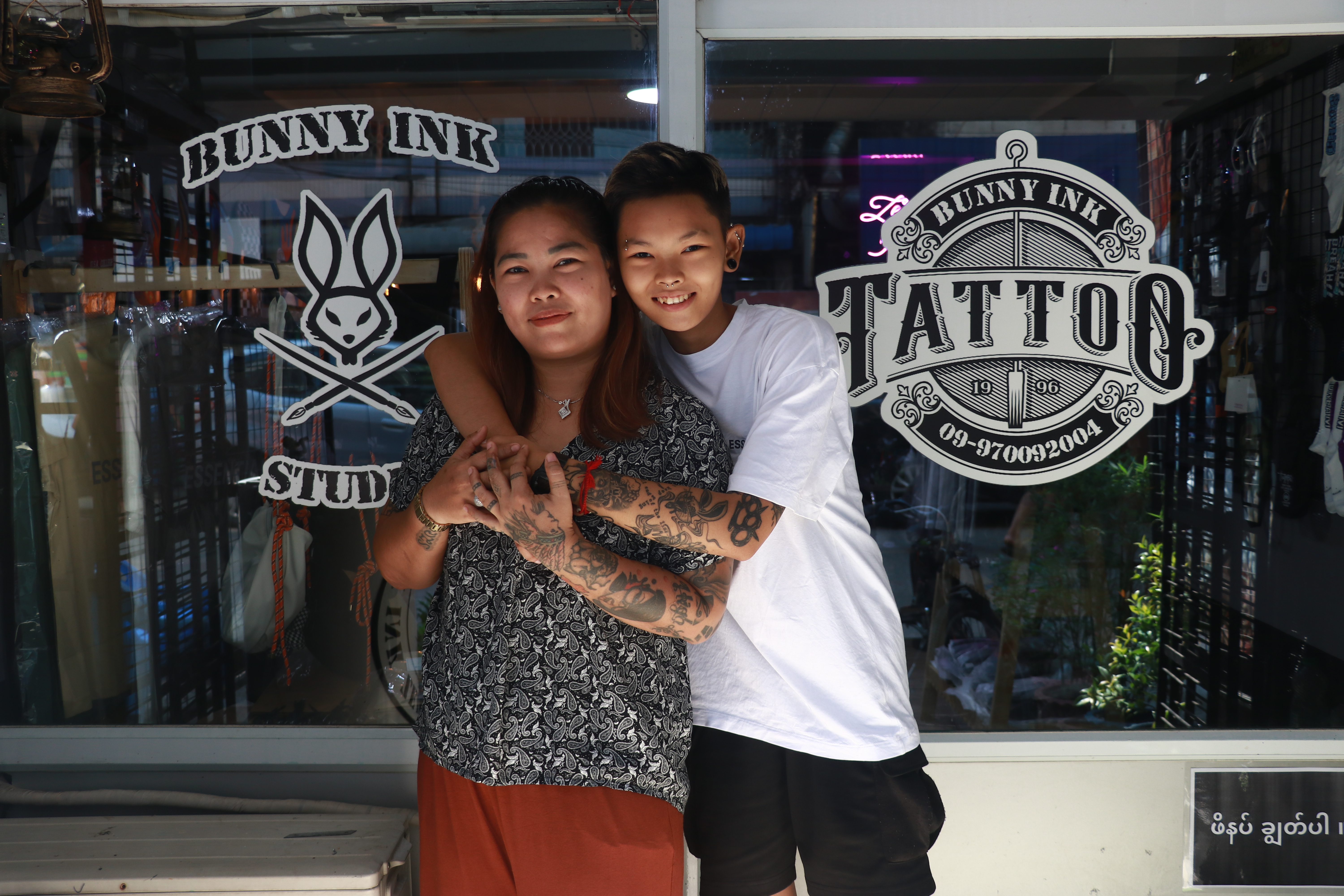
Question: Initially, your daughter was a tomboy, and then she became a tattoo artist. As the mother of a tattoo artist, how did you encounter the views of your community on her tattooing?
Answer: My name is Zarchi Soe Linn, and I am the mother of a tattoo artist known as Tattoo by Bunny. Before becoming the mother of a tattoo artist, I was a woman myself. I got married at 18 and had a child at 21. I've been living in Mandalay since I got married. In Mandalay, tattoos were a rarity, especially for women. I started tattooing there. At that time, I didn't even know if tattoos were good or bad, it was just a trial for me. Female tattoos were almost non-existent. They were rare. Then gradually, it became more common. Parents would say things. At our place, we didn't have tattoos. I've always liked painting, so I tattooed. People had diminishing views. Some would say with contempt that when you grow older, others will look down on you for having tattoos. Walking down the street also started becoming an issue. With men, there were frequent problems concerning such matters. Later, as the times caught up, more people started getting tattoos, and I also became more resilient to societal views. Initially, I didn't have any thoughts about it in my mind. I just tattooed. Later, people were surprised at how much tattoos meant to me. I draw cartoons and paintings that I like on my skin. There was nothing I disliked. I tattooed because I liked it. Even if I became a grandmother, I would say, "I'm a tattooed grandma," and later, I started responding like that.
Question: At what age did your child start showing interest in tattooing?
Answer: She started showing interest around the age of 11. She shares some common interests with me. She likes to paint and draws a lot. When I was working as a tattoo artist, she would help out, hanging around the shop. At first, I didn't realize it was her passion. She was just attending school and helping out occasionally. Then one day, when we were out, I saw that one of my shop's employees had a tattoo done by her. It was a small Kayin flag. When I asked where she got it tattooed, she said my daughter did it. When I asked more about when and how it was done, that's when my daughter admitted she had tattooed it on request. I was surprised. You can't just tattoo on someone's skin like that. Tattoos on the skin are permanent. Although laser removals are available nowadays, they don't completely erase the tattoo. After that, she stopped tattooing for a while. Only later did I notice that she hadn’t learned from anyone but was already able to tattoo. Eventually, when she started doing tattoos, she would ask me to look at her work. From there, she really began her journey into tattooing.
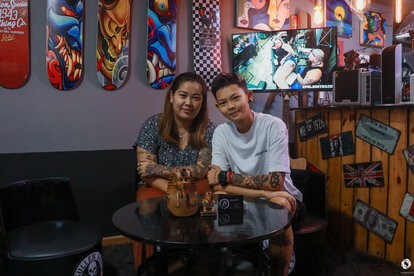
Question: When did you first realize your child was a tomboy? When did you become aware of this change?
Answer: Since she was very young. She is my first child, so I wanted her to be like a boy. I never dressed her like a girl from the start. She never wore typically girly colors. It was evident since she was about two years old.
Question: Did you face criticism from your community because she was a tomboy?
Answer: Yes, there were criticisms right from the beginning. People in our community would question why I dressed my child that way from a young age. They would buy feminine clothes for her, expecting her to change into a more traditional girl. I just satisfied them by taking pictures and sending them. I didn't argue back with them. What matters is my family and myself. We just continue on our own path.
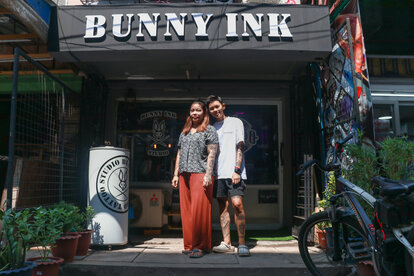
Question: At what age did your child start showing interest in tattooing?
Answer: She started showing interest around 11 years old. She shares some of my interests, like painting. She used to help out in my tattoo shop and observe the work. Initially, I didn't realize it was her passion. She was just going to school and occasionally helping out in the shop. One day, when we went out, I saw that one of my shop's employees had a tattoo done by her. It was then that I understood her interest in tattooing. She was around 11 at that time.
Question: How have you supported your child's career as a tattoo artist and being a tomboy?
Answer: I've always tried to be understanding and not to pay attention to what others say. Even if my child is different, I don't feel that she stands out excessively. I don't see her as an oddity. However, there are some things related to femininity that I still have to do for her, as she is shy. I've noticed that she wants to transition to being male. I always ask her if she is sure about this decision. She now wants to undergo chest surgery. I told her to wait until she's at least 20 years old to make such a significant decision. I always refer to her as my son, and she doesn't like it when others call her a daughter. She doesn't like the style of being called a daughter. I support her in whatever she wants to become. We have a close-knit family, and she confides in us. We're a family of four, and we all rely on each other. She shares everything with us. Although she's a tomboy, she's not very rebellious. I don't give her emotional stress. I support what she wants to be.
Question: As a mother, what challenges have you faced in raising a child with an unconventional career and being a tomboy in a society with traditional views?
Answer: There have always been judgmental people, those who look and comment. When someone is slightly different from the norm, they tend to attract more attention. I've always been positive-minded. No matter what others say about my child, I stay firm in my approach. There is one thing though - when it comes to marriage and related matters, I tell her to come to me. She's 19 now, and I've allowed her to make her own decisions about tattooing since she turned 18.
Question: How significant is a mother's support in the success of a child who is interested in a unique career like a tattoo artist and is a tomboy?
Answer: Nowadays, they have their own community, which is very supportive. One great thing is that when we support our child, their friends also become supportive. Some kids come over and say they wish they had a mom like me. Some parents don't like it. Some kids who come to the shop to get tattoos, like gay kids, say things like they don't want to be like this. My child sometimes wants to put on lipstick or wear dresses, and I want to be accepting of her choices like an aunt would. People are diverse, and my child is the only one like this. There might be some backlash if she is gay, but as parents, we know our child's situation the best. I believe that parental support can be the best support a child can get.
Question: As a mother, what advice would you give to other mothers who face similar experiences with their children?
Answer: The most important thing is that a mother is always a mother. A mother is the closest person to her children, more so than the father. We need to observe our children closely and understand what they want to become. We can't force them to follow our own desires. They are given their lives to live in their own ways. I believe we can't be too forceful. We need to observe and understand why our children are inclined towards certain paths. Children will want to do more of what they are not allowed to. We need to look at it from our perspective and understand them. We should focus on what they want to become.
Question: Finally, is there anything else you would like to share?
Answer: Since I married and became a mother at a young age, I have faced many challenges. What I want to say to all mothers, whether it's your own child or others, is that a woman should always have a motherly heart. I also mingle with my child's friends. I want to give my children a certain amount of freedom, but I don't allow drugs or excessive alcohol. They are more likely to do what is forbidden if we control them too much. I think both the mother and father should pay more attention. I don't pay attention to what others say. My children shouldn't feel overly different or special. I don't see them as extraordinary people. But being a mother is the most important role. A mother is always the closest to her children, more so than the father. We need to look at our children with an eye of detail and know what they want to be. We can't just force them to be what we want them to be.
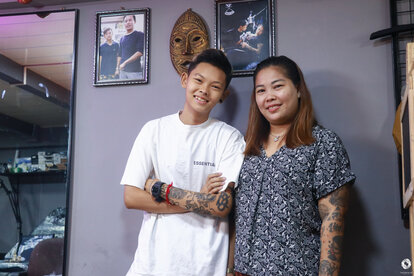
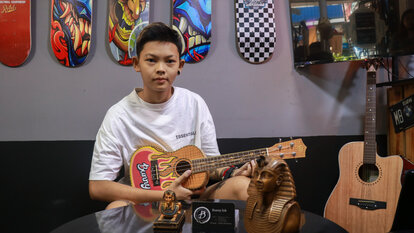
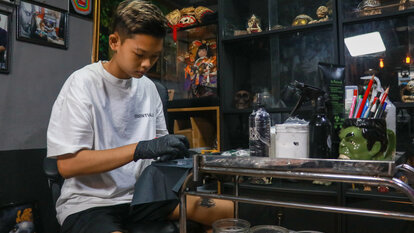
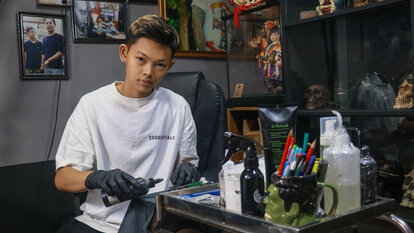
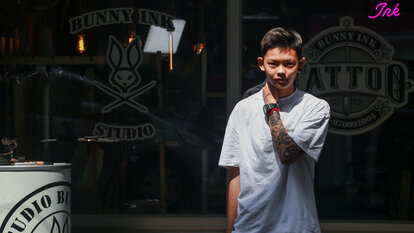
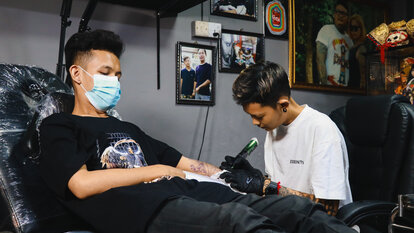
A mother is always the closest to her children, more so than the father. We need to look at our children with an eye of detail and know what they want to be. We can't just force them to be what we want them to be.
